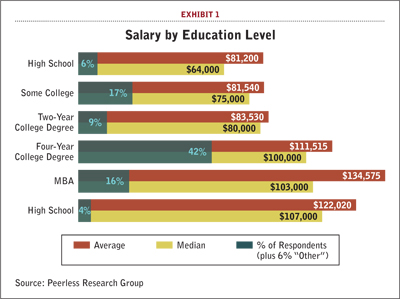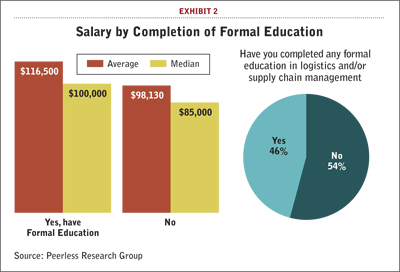Robert Cook isn’t having any trouble placing qualified supply chain program graduates in positions these days. A professor of marketing and logistics at Central Michigan University, Cook says his top undergrads are taking jobs right out of college that pay $52,000 to $60,000 annually, with the mid-range performers being offered positions that range from $46,000 to $47,000.
“Employers are hungry for qualified, educated, supply chain graduates,” says Cook. Some companies are reaching farther back into the pool of current students and shelling out $20-per-hour salaries, housing, and company cars (complete with unlimited mileage) to interns. “Ford, Amway, Kimberly-Clark, and others just hauled 20 of our students out of here to be summer interns,” says Cook. “Every one of them will earn $18-$20 per hour plus housing, at minimum.”
Cook says several factors are driving the current recruiting rush. A retiring Baby Boomer generation and an “existing shortage of supply chain majors,” are two key issues that companies are grappling with, he says. Add in the fact that the national economy is in slow-but-sure recovery mode with more companies paying attention to their supply chains and you wind up with a perfect storm that’s sweeping up well-qualified candidates. “Employers can’t get enough of supply chain graduates right now,” says Cook, “and we can’t turn them out fast enough.”
Making the Connection
As companies compete for the fresh crops of supply chain graduates, the professionals who are already in such positions are also benefitting from their education credentials.
The 2012 Logistics Management Salary Survey, found that supply chain professionals earned an average annual salary of $99,600 in 2012, down from $107,800 in 2011. Breaking the numbers down along educational lines, those with a four-year degree averaged $111,515 annually while professionals holding MBAs earned $134,575. (See Exhibit 1.)

The dividing line between these individuals and their lesser-educated counterparts was clear in the 2012 survey, which found that professionals with two-year degrees earned $83,530 while those with “some college” or “high school” earned about $81,000 annually in 2012. The highest paid supply chain professionals hold titles like vice president/general manager, corporate division manager, and supply chain manager.
According to the salary survey, 46 percent of respondents had completed some type of formal education in supply chain and logistics. Those individuals earned an average annual salary of $116,500, while those who did not concentrate in supply chain/logistics brought home an average of $98,130. (See Exhibit 2.) Fifty-three percent of respondents planned to take continuing education within the next 12 months, although only 26 percent feel that this will result in a higher salary (32 percent say it won’t impact salary and 42 percent were unsure).
According to the 2012 Career Patterns in Logistics and Supply Chain Management report from The Ohio State University’s. Fisher College of Business, the highest degrees attained for most of its survey respondents was graduate level (53.6 percent) and undergraduate level (40.1 percent). The MBA was the most frequent graduate degree, although other masters and doctorates were also represented as the “highest degrees.” Ten percent of respondents also held professional certifications over and above their degrees.
 About one third of the Ohio State University survey respondents—all of whom were Council of Supply Chain Management Professionals (CSCMP) members—held a degree or concentration in logistics at either the undergraduate or graduate levels. Most held upper-management positions with the largest category being directors (31 percent), followed by managers (26 percent), and vice presidents (18 percent). Salaries for presidents and vice presidents ranged from $95,000 to $300,000 annually; directors earned $100,000 to $225,000; and managers took home $75,000 to $150,000.
About one third of the Ohio State University survey respondents—all of whom were Council of Supply Chain Management Professionals (CSCMP) members—held a degree or concentration in logistics at either the undergraduate or graduate levels. Most held upper-management positions with the largest category being directors (31 percent), followed by managers (26 percent), and vice presidents (18 percent). Salaries for presidents and vice presidents ranged from $95,000 to $300,000 annually; directors earned $100,000 to $225,000; and managers took home $75,000 to $150,000.
In assessing the correlation between education and salary within the supply chain and logistics arenas, Tim Stratman, president at Chicago-based Stratman Partners Executive Coaching, says college education has become essentially mandatory for both new and existing professionals within the field. “It’s the ticket to the show,” says Stratman. “You get into the show because have a degree—preferably in supply chain management but possibly in operations management, engineering, or another technical area.”
Just how well supply chain pros are able to leverage those “tickets” into job opportunities, promotions, and higher salaries is up to the individual himself or herself, Stratman points out. “Once you sign on with a company the rules change somewhat,” he explains. “At that point instead of being [selected] based on education, you’ll be assessed on what you bring to the table and the performance that you drive.”
Achieving the delicate balance between technical proficiency and solid leadership skills is another important consideration for supply chain professionals looking to parlay education into higher salaries. That’s where continuing education comes into play, says Stratman, who sees the best opportunities being made available to supply chain and logistics professionals who put time into continuous self-improvement. “Ongoing professional development is important,” he adds, “because it allows individuals to use their [newfound] knowledge to get even better results for their companies.”
Professional Development Counts
As evidenced by both the Logistics Management and Ohio State University surveys, supply chain and logistics professionals who are armed with advanced degrees are more likely to settle in at the high end of the industry pay scale. Cook says that supply chain managers who are vying for higher spots on the food chain should consider an MBA for its cross-functional capabilities, even if that degree is in finance or accounting (versus supply chain).

“The MBA is a degree that adds a lot of value for the logistics professional,” says Cook. “In fact, you can hit a ceiling at some larger companies if you don’t have an MBA. You get to the point where you just can’t go any further.” Cross-training within the company itself is also vital, says Cook, who cautions supply chain professionals not to get too comfortable in their specialty areas, particularly if they’re interested in promotions and higher salaries.
“You can’t get pigeonholed into a mono-functional area and expect to be promoted to the top,” says Cook. “If you want to move on up the line you have to be cross-trained in purchasing, plant operations, inbound and outbound logistics, finance and accounting, and other functions.”
Stewart Lumsden, a partner with Chicago-based executive search consulting firm Spencer Stuart, Inc., concurs with Cook and says companies are seeking out supply chain professionals who are equipped with broader business backgrounds. Lumsden, who leads his firm’s Supply Chain Practice in North America, recruits across industries for a broad array of manufacturers, retailers, and service providers. In talking to his clientele, Lumsden says their ideal supply chain professional candidates are those who understand broader business concepts, how money is made, and the impact that the supply chain has on the bottom line.
“Finding candidates who bring that broader business vantage point to the table has become a priority for companies,” says Lumsden. He adds that there is continued demand for technical education and expertise, be it a supply chain-specific degree or an engineering degree.
“Particularly if it’s on the manufacturing side, a technical degree is very appealing because of all the analytical rigor that goes on within the supply chain,” Lumsden explains, noting that the advanced degree (the MBA) has become a differentiator for its holders because it displays broader business capacity. “Individuals can distinguish themselves in the industry by having that technical degree, and the underpinnings required, and then coupling that with the MBA. It’s a very powerful combination.”
Just Rewards
In assessing the relationship between education and earnings in the supply chain realm, Lumsden says that while individuals with degrees are exposed to more opportunities, whether they turn those chances into higher salaries is largely an individual exercise. “With the right educational mix and with a strong career trajectory,” says Lumsden, “those individuals are going to be exposed to a lot of opportunity that will by its very nature allow them greater earning power.”
As supply chain professionals assess their current positions, education, and opportunities, Stratman says it’s important to understand that a multidimensional effort typically plays out best in the corporate world. “The goal should be to integrate education, experience, intellect, and emotional intelligence into a saleable package,” says Stratman. “Then the advancement, promotions, and financial rewards will follow.”
SC
MR

Latest Supply Chain News
- Despite American political environment, global geopolitical risks may be easing
- Joseph Esteves named CEO of SGS Maine Pointe
- Employees, employers hold divergent views on upskilling the workforce
- April manufacturing output slides after growing in March
- Q1 sees a solid finish with positive U.S.-bound import growth, notes S&P Global Market Intelligence
- More News
Latest Podcast

 Explore
Explore
Latest Supply Chain News
- Despite American political environment, global geopolitical risks may be easing
- Joseph Esteves named CEO of SGS Maine Pointe
- Employees, employers hold divergent views on upskilling the workforce
- April manufacturing output slides after growing in March
- Q1 sees a solid finish with positive U.S.-bound import growth, notes S&P Global Market Intelligence
- World Trade Centers offers a helping hand to create resilient, interconnected supply chains
- More latest news
Latest Resources

Subscribe

Supply Chain Management Review delivers the best industry content.

Editors’ Picks




